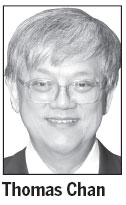'Baodiao', MNE - contrasting issues over national identity
Updated: 2012-09-15 05:39
By Thomas Chan(HK Edition)
|
|||||||
There are two major political issues facing politicians and the general populace in Hong Kong: the national education controversy and the defense of Diaoyu Islands. The issue of moral and national education is exclusively a domestic issue confined to the education policy of the SAR Government, implications of which however involve political attitudes towards the central government and the Chinese national identity.
The current anti-national education debates have been politically charged with accusations of brain washing implemented by the SAR government on behalf of the central government in Beijing. In the heated local discussion, the issues raised explicitly or implicitly relate to whether Hong Kong should accept the legitimacy of the central government, and thus the "One Country, Two Systems" under the Basic Law granted by the central government. They concern the national identity of Hong Kong people and society.
The "Defend Diaoyu Islands" movement since the early 1970s has definitely been a nationalist one, without any doubts and questions about the legitimacy of the Chinese government and its claim to sovereignty over the islands. Participants in the movement have taken both the Communist government in Beijing and the Nationalist government in Taiwan. It is a broad nationalist movement in defense of Chinese territory against foreign encroachment and occupation. There has been no change in its orientation even lately and the movement always sees itself as part of a broader movement involving all Chinese in China and overseas, and despite the organization's strong presence in Hong Kong it has never regarded itself as a local movement serving only local purposes.

On the one hand we have an issue, moral and national education, in which Chinese national identity is held up to questioning. On the other hand, Chinese identity is strongly embraced in the "Defend Diaoyu Islands" movement. They present a hard choice for local political activists and the wider society in Hong Kong. The support of one will mean the negation of the other, and the real question posed is whether local activists will accept one and abandon the other. Or will the conflicting conceptions of national identity posed by the two issues lead them and the wider Hong Kong society to rethink their stance towards Chinese national identity.
The suspicion about Chinese identity in the anti-national education protests may stem from a general dissatisfaction over the performance of the SAR government since the handover in 1997. Despite the support from the central government, economic and social development in Hong Kong have been slow. For many, in particular the young, life opportunities appear much less promising than before the handover. Poverty and economic and social polarization have increased also in the 15 years of the SAR government. The distrust and dissatisfaction with the SAR government have been manipulated to question the legitimacy of the local government and in a far fetched way to doubt even about the handover and the credibility of the central government, which is responsible for the appointment of the SAR government.
It is true that the SAR government failed to deliver in the past 15 years, but with central government support, the economy of Hong Kong has not been so bad as compared with many countries, which have suffered similarly the two financial crises in 1997/98 and 2008/09. It is still difficult to understand how the political attitude of local political activists could change so radically as to challenge the Chinese national identity. Is it a skillful manipulation and mobilization by some groups of anti-Chinese political activists that mislead the general populace? Or are there deep rooted structural factors in the local society that have been responsible for this sudden radical attitudinal change?
A good test will be the "Defend Diaoyu Islands" movement in Hong Kong. If local political activists refuse to participate in the local movement against Japan, one would then be more convinced that there is little Chinese national identity among them and they should be regarded as hostile to the development of "One Country, Two Systems" and the integration of Hong Kong with the Chinese mainland. If they embrace the movement wholeheartedly, it means that they still regard themselves as Chinese, even though they may have different ideas about China and the political system.
The author is head of China Business Centre, Hong Kong Polytechnic University.
(HK Edition 09/15/2012 page3)